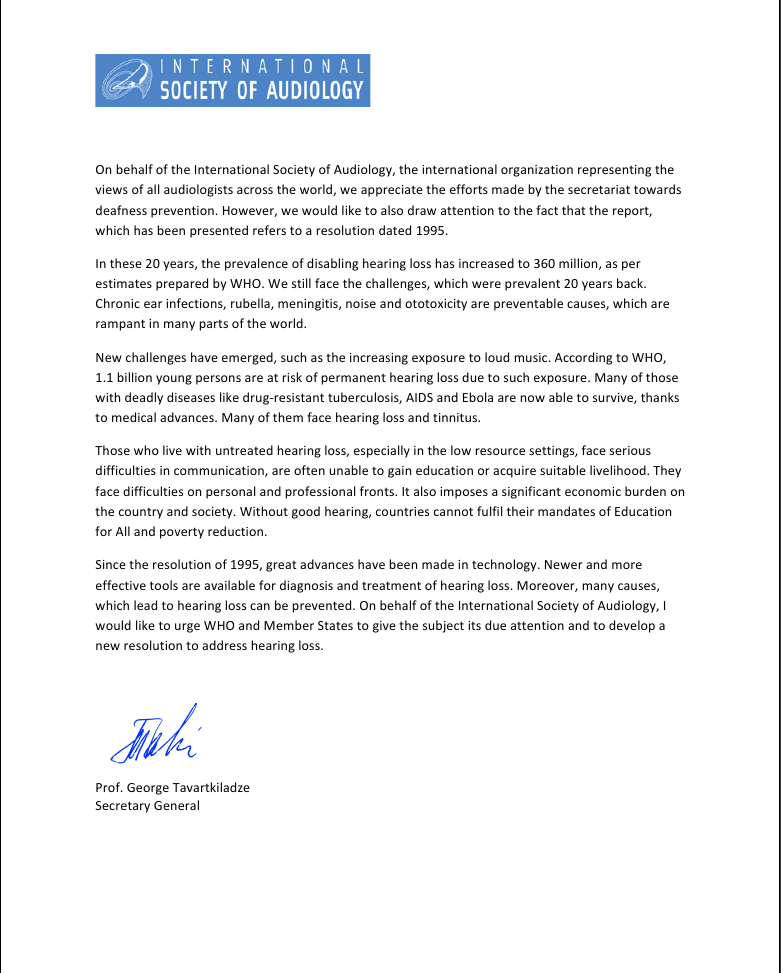68-я Всемирная Ассамблея Здравоохранения
С 18-го по 26-е мая 2015 г. в Женеве проходила 68-я Всемирная Ассамблея Здравоохранения.
В день открытия Ассамблеи по инициативе Международного общества аудиологов и Международной федерации оториноларингологических обществ было проведено совещание по профилактике нарушений слуха, на котором проф. Г.А.Таварткиладзе был представлен опыт Российской Федерации по раннему выявлению нарушений слуха им реабилитации больных с тугоухостью. Последняя Резолюция по слуху была принята Всемирной ассамблеей здравоохранения двадцать лет назад в 1995, поэтому проведение совещания имело принципиальное значение.
По результатам совещания был подготовлен отчет по реализации программ профилактики нарушений слуха в странах – участницах Всемирной организации здравоохранения.
В последний день Всемирной Ассамблеи Здравоохранения после отчета Генеральным секретарем Международного общества аудиологов проф. Г.А.Таварткиладзе было сделано заявление, обосновывающее необходимость разработки и принятия новой Резолюции по слуху на Всемирной Ассамблее здравоохранения в 2016 году, которое было поддержано 57 странами – участницами ВОЗ, в том числе Российской Федерацией.

Текст заявления:
On behalf of the International Society of Audiology, the international organization representing the views of all audiologists across the world, we appreciate the efforts made by the secretariat towards deafness prevention. However, we would like to also draw attention to the fact that the report, which has been presented refers to a resolution dated 1995.
In these 20 years, the prevalence of disabling hearing loss has increased to 360 million, as per estimates prepared by WHO. We still face the challenges, which were prevalent 20 years back. Chronic ear infections, rubella, meningitis, noise and ototoxicity are preventable causes, which are rampant in many parts of the world.
New challenges have emerged, such as the increasing exposure to loud music. According to WHO, 1.1 billion young persons are at risk of permanent hearing loss due to such exposure. Many of those with deadly diseases like drug-‐resistant tuberculosis, AIDS and Ebola are now able to survive, thanks to medical advances. Many of them face hearing loss and tinnitus.
Those who live with untreated hearing loss, especially in the low resource settings, face serious difficulties in communication, are often unable to gain education or acquire suitable livelihood. They face difficulties on personal and professional fronts. It also imposes a significant economic burden on the country and society. Without good hearing, countries cannot fulfil their mandates of Education for All and poverty reduction.
Since the resolution of 1995, great advances have been made in technology. Newer and more effective tools are available for diagnosis and treatment of hearing loss. Moreover, many causes, which lead to hearing loss can be prevented. On behalf of the International Society of Audiology, I would like to urge WHO and Member States to give the subject its due attention and to develop a new resolution to address hearing loss.

